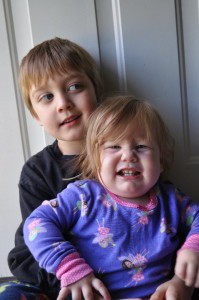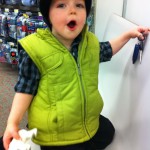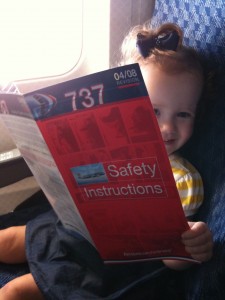My 20-month-old daughter is very easy to parent. Okay, well, that’s not entirely true. She’s aptly-nicknamed “Aurora the Destroyer” for her desire to explore and investigate, and her physical and mental abilities to not only climb to higher places, but figure out how to position things to climb to even higher places. But her needs, those are still simple. In her universe, most problems are still limited to being hungry, tired, dry, or bored, and most solutions are limited to food, a diaper or a breast.
My son Rowan, on the other hand, will be 7 in April, and he’s the one I struggle with. As a toddler, he was less physically draining but much more emotional than his sister, and that’s carried on into childhood. To compound things, he is in first grade with a less-than-emotionally respectful teacher, he’s a big brother, and I work from home as well. And of course, with age comes much more complex problems, and naturally, more complex solutions. With his emotional tendencies also comes some emotional outbursts — from him and me.
 Being an Attachment Parent to babies and toddlers is very simple, and logically, you’re setting the groundwork then for childhood and adolescence, but maintaining the same relationship gets tougher and tougher. As we know, you can never be perfect at parenting — as your child always grows and changes, your parenting does as well. With a toddler, a job, and an upcoming move, I often feel like my changes as a parent, my growth alongside his has fallen behind, and we’re butting heads and struggling more with maintaining positive discipline and respect, both towards him and from him.
Being an Attachment Parent to babies and toddlers is very simple, and logically, you’re setting the groundwork then for childhood and adolescence, but maintaining the same relationship gets tougher and tougher. As we know, you can never be perfect at parenting — as your child always grows and changes, your parenting does as well. With a toddler, a job, and an upcoming move, I often feel like my changes as a parent, my growth alongside his has fallen behind, and we’re butting heads and struggling more with maintaining positive discipline and respect, both towards him and from him.
However, every time I start thinking, “What have I done wrong? Did I break our relationship?” I also stop and think, “What am I DOING wrong?” Then, the basics become clear again. Regardless of age, some things still stand true:
1. You have to stop and listen to their needs. The more distanced you are from them, the more complicated figuring them out will be. Also, the bigger they are, the more aware they are of whether or not you’re really listening and caring. Sometimes you’re going to need to have someone remove the little sibling from the room or wait for a nap so your child can really know all the attention is on them, and only them. But of course, as long as you follow through, nothing is wrong with letting your child know you need to wait until ___ time, and then you’ll sit down and talk.
2. You have to accept that you aren’t always going to be perfect… and neither are they. Sometimes you’re going to suck. Sometimes you will be really distracted, concentrating hard on something, and will say something in a less-than-ideal manner… and chances are, your kid will respond in kind. A very important lesson for you to learn is that there’s no erasing mistakes, but there’s learning from them. In fact, almost as important as what you do the first time is how you handle things when you’re patching them up.
3. Remember the behavior is only a symptom. Just like with infants, you still need to remember that they did whatever they did, or didn’t do, for a reason, and that’s what you need to figure out. Getting down at their level, with a sympathetic face and tone, is very important, but so is respecting when they’re not ready to talk. Nothing irritated me more as a child than trying to walk away so I could calm down and being followed, which leads me to…
4. Respect their autonomy. Allowing children to have a space that’s theirs, and letting them have it as somewhere they can request to be alone is invaluable. If you’ve been respectful and open and available with your child, they’ll start becoming independent all on their own, and with that comes the request for certain autonomy, like being able to have a space of their own that a sibling can’t destroy. If Rowan is annoyed with Aurora, he knows his room is a place he can do things without her interference.
5. Try to make as much time just for them. This one is particularly difficult in my household as childcare isn’t readily available or desirable for us, but even just playing a game with my son while she’s napping or nursing can make all the difference.
Overall, the general mantra is: Be patient, be present and be respectful. Life can really start making things difficult, but the longer you let the distance grow, the worse things will get. Taking the time, even when you feel you don’t have it, so close that gap again is so, so important.
What do you feel is most important when dealing with older children?




